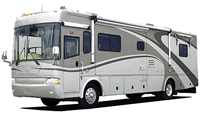RV and ATV Insurance
 A common practice for RV owners is to insure their RV under their current auto policy. But too often the owner does not take the time to read what and how much is covered under their auto policy. In many instances, RV’s covered under auto policies are not adequately covered.
A common practice for RV owners is to insure their RV under their current auto policy. But too often the owner does not take the time to read what and how much is covered under their auto policy. In many instances, RV’s covered under auto policies are not adequately covered.
One misconception RV owners have is that the personal property in their RV will be covered under their homeowners policy. This is true, but, coverage on personal property is limited when the property is kept somewhere other than the “residence premises.” Often the limit in a standard policy is very low and the usual policy deduction would apply.
To insure proper and adequate coverage, a RV owner should add a separate RV coverage to their current auto policy or secure a policy specifically for RV’s
If the RV owner’s insurance carrier does not have this type of coverage available, there are insurance companies that specialize in RV coverage. Usually the cost is minimal, especially compared to the alternative of finding out the RV and it’s possessions are not covered after a loss occurs.
Tips When You Hit The Road
Before your trip, make sure you get a complete travel check-up for your RV including inspection of all belts and hoses, headlights, tires, and turn signals. Also don’t forget to make sure the towing hitch, fire extinguisher and smoke alarms are in working order.
Other good before trip tips are to make sure your cooking vent hood is clean to help avoid fires and to make sure you leave your trip plans and phone numbers with a relative or friend.
Finally, it is important to go over with everyone on the trip basic emergency procedures.
Remind everyone that it is safer to be in the RV during lightning. If there is a tornado warning you will want to find a tornado shelter or the next best thing which would be parking under a bridge or similar structure. Also, don’t ever drive through any deep water as the depth can be deceiving.





